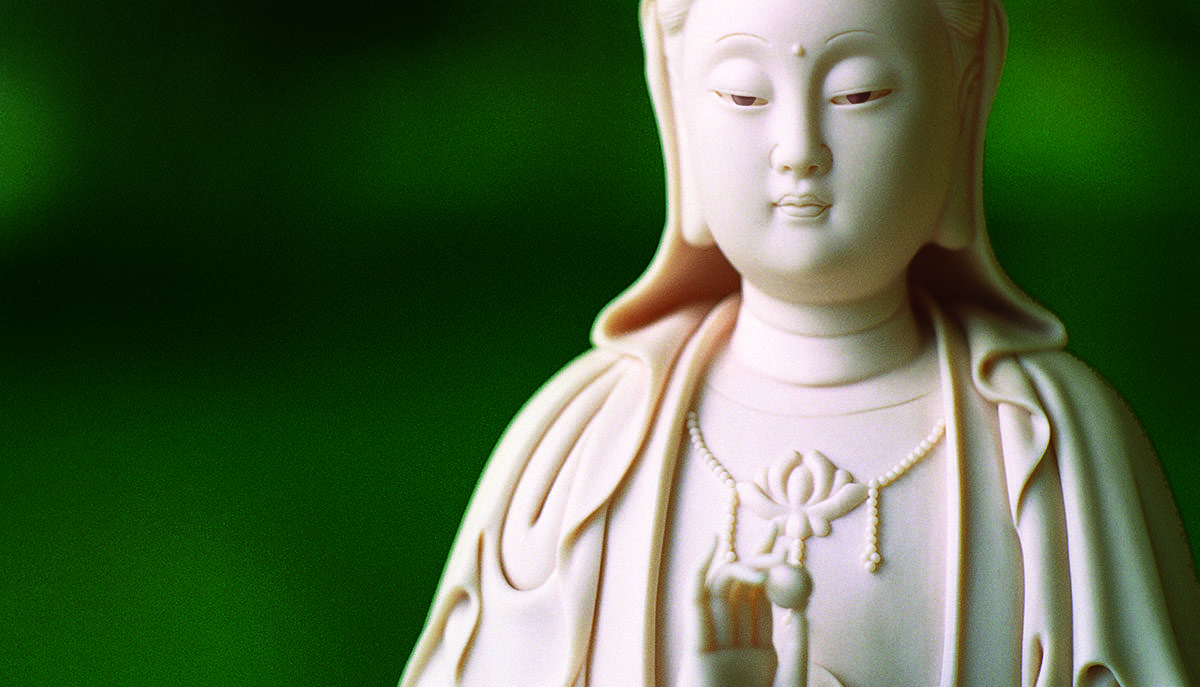Traditionally, the practice of the perfection of generosity (dana paramita in Sanskrit) is the gateway to the bodhisattva path. Why? Bodhisattva practice is radical. It involves a fundamental shift in our approach to life. It begins with a serious examination of our attitudes, where they come from, and how they condition the way we see, think, feel, and act.
What is attitude anyway? Attitude is the climate of our lives. Everyone has some kind of attitude or set of attitudes. Probably we have never thought about them, never examined them, and don’t much experience ourselves as having any particular attitudes. A fish doesn’t know what water is because it sees and experiences everything through the medium of water. Like a fish in water, we swim in the medium of our attitudes.
In the bodhisattva path, we don’t assume anything is fixed and solid.
Or maybe attitude is character: We are this or that sort of person. We are kind, generous, animated, quiet, fearful, grouchy, stingy, “nice,” not very nice, relaxed, anxious. We think life is good, people are good. Or we think life is a struggle and people are not to be trusted. And so on. However much we haven’t examined them, all of us have fairly consistent attitudes that condition our lives. Our attitudes may be self-contradictory and confused, but we don’t notice. Few of us have the time or capacity for deep self-reflection, and even if we did, the more we looked, the more confused we’d get. It’s hard to see ourselves accurately. Our attitudes distort the picture.
Attitude literally means “stance.” The way you hold your body, your posture; the way you stride forth into your life.
We come by our attitudes honestly. We get them from our parents, communities, and cultures; from our experiences, traumas, and triumphs. We assume our attitudes reflect reality. We assume they are fixed and unchangeable.
But attitudes aren’t fixed. Neither is the world. Neither are we. In the bodhisattva path, we don’t assume anything is fixed and solid. And we don’t assume that our picture of the world is the way the world has to look. This is where imagination enters in. Imagination is a warm breeze that loosens up what seems rigid and cold. Bodhisattvas have imagination. They assume that anything can be fluid and warm, subject to challenge and revision. They see that everything is provisional and open. Inspired by their imaginations, bodhisattvas believe that there are always possibilities.
The perfection of generosity confronts and softens our basic attitudes. To practice it is to appreciate the natural abundance of being, the inherent generosity of time and space, and the ongoing unfolding of life. These are exquisite gifts. Life itself is generous. Life is always making more life. Life is abundant and expansive, never stingy or small-minded. It keeps on going, bubbling up and expanding wherever it has a chance.
You don’t need to create life; you just have to let it in. The grasses on the hillside are ready to burst out green as soon as a little rain falls and a little sunlight peeps through. Weeds and vines tangle all over the place. Life stopped in one place pops up somewhere else. Nature is prolific. Even the falling apart of things is generous: big trees topple willingly in heavy winds; they provide food for insects, bacteria, fungi, and other trees and plants. It’s sad in our time to see so many species disappearing. More than sad. But species have always disappeared, and new species have always arisen. When we say we are destroying or protecting the earth, we are expressing our dismay and our love, but we are also being a bit arrogant: the earth is fine, and life on earth will continue in some form no matter what we do, because life is generous and fecund and it cannot be stopped. As long as the sun shines, life in some form will continue.
It’s true that human activity is messing up life as we have known it, and this is terrible. We absolutely must correct this. But we are not smart enough or destructive enough to kill life. Life is too generous and resilient for that to happen. And it’s not as though we exist in a special category outside of life. We are life as much as anything else. Life goes on even if we do not.
The practice of the perfection of generosity eventually effects a basic attitude shift toward the recognition that we are living creatures who share in life’s great abundance, freedom, and energy. So we always have possibilities. We always find a way, no matter how or what, to further our life. We just have to figure out how to stop getting in our own way. This is where the intentional practice of the perfection of generosity helps.
Someone once asked Tang dynasty Zen Master Baijang why giving is the gateway to the bodhisattva path. Baijang answered that it is because to practice giving is to practice letting go. The monk then asked, “What do you let go of?” Baijang said, “You let go of narrow views. You let go of the idea that things are small and tight, graspable and possessable.”
Baijang is emphasizing the open and wide spirit of generosity. He is showing us that it is the crabbiness of our thinking, the stinginess of our minds, our desire to judge, evaluate, separate, define—holding on to scraps—that stop us from opening to the abundance that must be within us, living beings that we are. Why can’t we be as generous as trees?
How to Open Up
How do we go about challenging and opening up our stingy attitudes about reality?
First, we pay close attention to our thoughts and viewpoints, which are expressions of our attitudes. If as living beings we are heir to a generous spirit, what blocks it? We have to investigate this. We have to become diligent students of our own minds, messy and unpleasant as they often are.
We study our minds by noticing in detail whenever we feel pinched, small, fearful, or stingy; whenever we find ourselves seeing the glass half-empty rather than half-full, or clenching up with defensive and protective feelings. We learn to identify these feelings in our bodies and minds—noticing the tightness in our chests and breathing, the clenching in our shoulders and faces, the old familiar paranoid and panicky trains of thought.
With lots of patient repetition and training, eventually we learn how to notice these things before they run away with us. We learn to catch ourselves in midstream and just, literally, stop. If we are walking, we stop walking. If we are sitting, we stand up. We take a conscious breath or two and ask ourselves, “Is this really true? Am I really under attack? Is there really not enough to go around?” And we ask further, “What are the effects of this habit of mind?” This process and these questions are practices. We take them up repeatedly. We work at them.
When you practice the perfection of generosity in meditation, you open up.
Usually when we ask these questions, we answer no. We are not really under attack, and there really is enough to go around. What’s bothering us is probably more a matter of pride and habitual defensiveness than reasonable necessity. When we reflect further, we notice that the consequences of this habitual response are not good: we end up with words, deeds, and feelings that cause us trouble and mess and that compromise our health, state of mind, and relationships. If we investigate and intervene like this again and again, we will eventually see our small-mindedness for what it is: an unsuccessful habit based on inaccurate information—a bad attitude.
Doing this consistently takes mental discipline. It is a kind of emotional yoga. But when you are motivated and determined, you can do it, especially if you have the support of your meditation practice and a community of friends to help you.
In fact, meditation practice is the best way I know to cultivate the expansive attitude of generosity. It is, of course, possible to sit down in meditation crabbed into yourself, obsessed with your thoughts, worries, and the constrictions of your situation. To practice the perfection of generosity in meditation is the opposite of this. When you practice the perfection of generosity in meditation, you open up, your fear and anxiety soften and dissolve, and you sit in the middle of the great gift of limitless, imaginative life.
Settling down and paying attention to body and breath will absorb the free-floating anxiety that is usually there in your mind, without your knowing it. This enables you to relax and let go into that generous spaciousness. Sit in the midst of it. You can say to yourself, “This is life: body, breath, consciousness. I share it with everyone and everything. It holds and protects me.”
Be willing to keep sitting like this every day, and bit by bit you will be able to see some daylight in your basic attitude that wasn’t there before—patches of blue sky peeking through the clouds.

